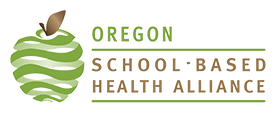Healthy Relationships
Summary of 2018 - 2019
(Download this summary)
OSBHA was provided funding by EC Brown to support our ACTION grant program, Student Health Advocate group, Statewide Youth Action Council group, School Health Advocacy Day event, and the Healthy Teen Relationship Act (HTRA) Implementation Project which concluded on December 31, 2018. OSBHA also received one-time calendar year funding for Student Health Advocate Expansion and Healthy Relationship Youth-Led Training.
1. ACTION Grants
Activities facilitated and promoted: ACTION grants (Advocating Consent, Teaching Inclusion, and Organizing for Nonviolence) were awarded to four School-Based Health Centers in Columbia, Multnomah, Umatilla, and Washington counties to facilitate healthy youth relationship programming. All ACTION grantees implemented the following activities:
- Implemented 8 lessons each year from designated healthy youth relationship curricula
- Built partnerships with designated community partners, including health educators, domestic and sexual violence advocates, or others within the school community
- Hosted one or more events for youth focused on one of the following topics: healthy youth relationships; sexual health; sexual violence prevention; how to make their community and relationships more equitable, responsive, restorative, and resilient; social justice as it pertains to youth relationships and sexual health
Major Impacts and Success:
Columbia County: Columbia Health Services (CHS) was able to dedicate staff time to creating healthy relationship media messaging on a variety of online platforms. Student surveys indicate that the In Their Shoes lessons helped students better identify healthy relationships (86% of respondents) and most students gave positive verbal feedback at the end of the lesson. YAC members reflected that it was fun to have all of their peers talk about health-related issues and that it “brought up” topics that they don’t feel like they can normally discuss in school such as healthy relationships and birth control access.
Multnomah County: The key results of this project have been increased engagement with youth of color and LGBTQ youth in our work, increased student awareness and understanding of the intersections between health equity and healthy relationships, and stronger partnerships to further support young folks’ in these areas. In discussing sexual and reproductive health services, they learned about how
some students experienced barriers in asking for condoms due to variability in how staff were interpreting condom policies. This led to internal discussion and clarification around policies to ensure that they are better meeting all of our students needs and decreasing barriers to access.
Based on YAC student feedback: Over 90% of students reported increased confidence in identifying key health issues (e.g., health equity, healthy relationships) and talking to peers about these issues. Over 85% of students reported increased confidence in making a change to improve their own health and improve school health issues. About 2/3 of students reported increased confidence in talking with teachers/adults about health issues.
Umatilla County: This project has helped to build and grow partnerships with local agencies and the school. They have also been able to stay connected with youth and utilize peer messaging to promote healthy relationships. 93% of Gay Straight Alliance students surveyed stated that they learned things about sexual and reproductive rights that were relevent to them, 73% said their knowledge of sexual consent increased, 80% said they learned things about respectful relationships that were important to them, and 93% said their knowledge of STIs increased.
In Health 1 classes, students were surveyed after participating in healthy relationship classroom presentations. 90% of surveyed students said they felt like they understood the characteristics of a healthy relationship, 89% said they feel like they could identify abusive characteristics in their relationship or someone else’s, 72% said they feel like they could communicate their feelings in a healthy way when they are angry (with 22% responding that they were neutral on that question), and 87% said the information presented could be applied in real life.
Washington County: The students are greatly impacted by the activities the SHAC puts on. They have begun looking forward to SHAC events and see SHAC as the health club the school can count on. For the SHAC members, the group offers them a safe space. A good example of this was that a student shared she had recently had a miscarriage. Another student, who is normally very stoic, asked if she wanted a hug. They hugged and it was really great to see two people connecting and supporting each other who were not friends before they joined SHAC. This interaction made a real difference for the girl who had miscarried. Students share things with each other during meetings that makes them vulnerable and often state that they feel safe in meetings.
2. Student Health Advocates
Activities facilitated and promoted: Student Health Advocates strengthen the youth voice in healthcare access and in the promotion of healthy relationships. The 18-19 Student Health Advocate cohort included 13 participants who met bi-weekly in Portland. They participated in more than ten events, including creating a panel for the American Cancer Society’s Oregon HPV Summit, speaking on an HPV Panel at Tigard High School, creating and facilitating workshop at the Consent Convergence Summit, planning and conducting the statewide Youth Action Council Summit and School Health Advocacy Day, participating in the Healthy Teen Relationship Act Implementation Project summary, and publishing five blogs about sexual health and healthy relationships.
Major Impacts and Success: The Student Health Advocates had a very successful year with 13 participating members and one coach (we started the year with 15 but 2 members did not complete the year). Members participated in over 10 speaking engagements, published 5 blogs on our website and engaged in new committees designed to develop skills in specific focus areas, including STD/STI Prevention.
3. Statewide Youth Action Council
Activities facilitated and promoted: The Statewide Youth Action Council was designed to offer advocacy opportunities for youth throughout the state. They meet once a month from January 2019-May 2019 to discuss their ACTION grant projects and their school priorities. The 2018-2019 cohort had 3 members appointed by local YAC coordinators from Washington and Multnomah counties. Members helped with the planning of the YAC Summit.
Major Impacts and Success: We struggled with recruitment and retention this year. We made a couple changes this fall with the goal of increased participation, including adding financial stipends, implementing additional recruitment strategies, and identifying specific opportunities & events for SYAC members. These efforts didn’t pay off as we had hoped, but we had fruitful conversations with the students who were SYAC members this year.
4. School Health Advocacy Day
Activities facilitated and promoted: We hosted our 12th School Health Advocacy Day event on February 28, 2019. The theme for this year's event was "Advocacy Doesn't Stop Here" and despite snow across the state, we still had over 100 students travel to the State Capitol to advocate for SBHC services and gain leadership skills.
Major Impacts and Success: Students facilitated 27 meetings with their legislators to discuss the importance of school-based health services including health relationship programming. The Student Health Advocates led two workshops on “How to Call and Write to Your Representatives”, and provided a handout on various health-focused bills.
5. Healthy Teen Relationship Act (HTRA) Implementation Project
Activities facilitated and promoted: OSBHA led a collaborative effort to implement the Healthy Teen Relationship Act (HTRA) at Cleveland and Franklin high schools. From July 1, 2018-December 31, 2018, this project provided healthy relationship educational & advocacy services to 4,506 students; 212 administrators, teachers, and school-based health center staff; and 4 parents. These services were recognized as valuable by students, administrators, teachers, and school-based health center staff who were surveyed.
Major Impacts and Success: This project supported the development of healthy relationship and sexual health education school policies and procedures for Portland Public Schools. Policy and systems changes at PPS attributed in part to the HTRA Pilot Project by PPS in April 2019:
- PPS passed a comprehensive sexual education policy in June 2018 that includes an all-new incident form. HTRA project partners collaborated in developing the new policies.
- The presence of confidential non-reporting advocates in the schools was approved.
-
PPS approved development of K-8 health and sex education curricula, and extend the curricula to include consent, boundaries, and teen dating violence in grades 8-12.
Healthy relationship advocacy has been extended to more high schools in PPS. - PPS plans to continue and grow the healthy relationship work of the pilot project, either by training PPS staff to provide prevention education and confidential support, or to continue to work in collaboration with community organizations such as Raphael House and VOA Home Free. How the work will be extended will depend on resource sustainability options.

